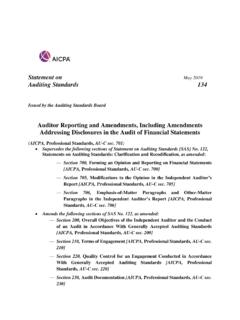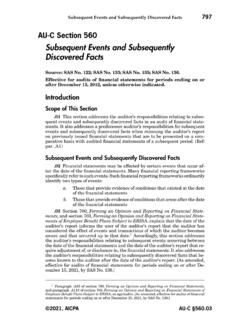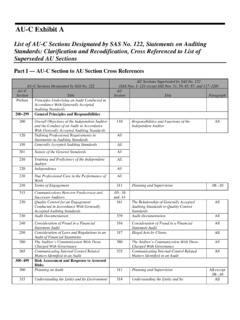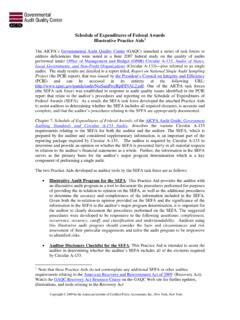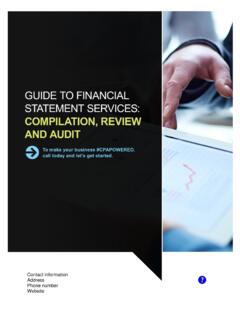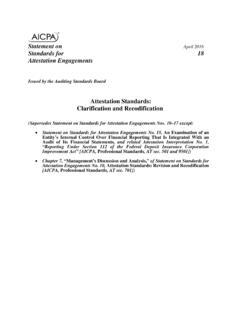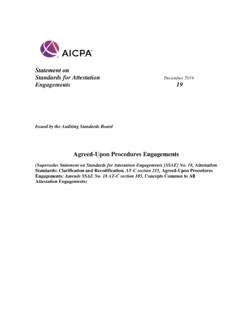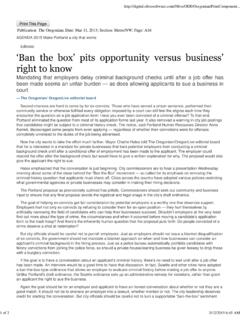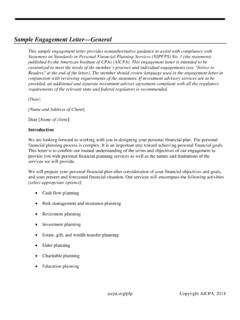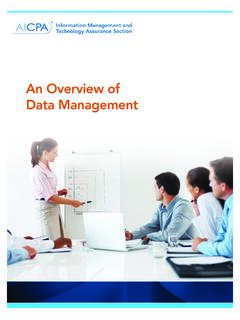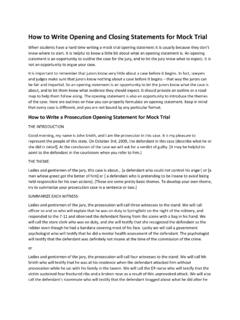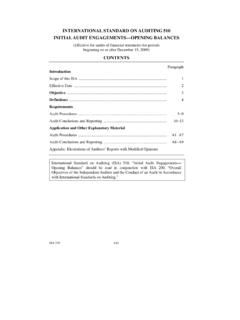Transcription of Opening Balances — Initial Audit Engagements, Including ...
1 Opening Balances Initial Audit Engagements617AU-C Section 510 Opening Balances Initial AuditEngagements, Including ReauditEngagementsSource: SAS No. 122; SAS No. 134; SAS No. 135; SAS No. 136; SASNo. for audits of financial statements for periods ending on orafter December 15, 2012, unless otherwise of This section addresses the auditor's responsibilities relating to open-ing Balances in an Initial Audit engagement , Including a reaudit engagement . Inaddition to financial statement amounts, Opening Balances include matters re-quiring disclosure that existed at the beginning of the period, such as contingen-cies and commitments. When comparative financial statements are presented,the relevant requirements and guidance for comparative financial statementsin section 700,Forming an Opinion and Reporting on Financial Statements,orsection 703,Forming an Opinion and Reporting on Financial Statements of Em-ployee Benefit Plans Subject to ERISA, also apply.
2 Section 300,Planning an Au-dit, includes additional requirements and guidance regarding activities prior tostarting an Initial Audit . Section 708,Consistency of Financial Statements,alsoapplies with respect to the auditor's evaluation of the consistency of accountingprinciples between the periods presented and covered by the auditor's 210,Terms of engagement , includes requirements and guidance withrespect to communications with a predecessor auditor before accepting an ini-tial Audit engagement , Including a reaudit engagement . [As amended, effectivefor audits of financial statements for periods ending on or after December 15,2021, by SAS No. 136.].02 This section, with respect to predecessor auditors, does not apply if themost recent audited financial statements are more than one year prior to thebeginning of the earliest period to be section is effective for audits of financial statements for periodsending on or after December 15, objective of the auditor, in conducting an Initial Audit engagement , Including a reaudit engagement , is to obtain sufficient appropriate Audit evi-dence regarding Opening Balances about whether (Ref: par.)
3 A1) Balances contain misstatements that materially affectthe current period's financial statements and 2021, AICPAAU-C accounting policies reflected in the Opening balanceshave been consistently applied in the current period's financialstatements or changes thereto are appropriately accounted forand adequately presented and disclosed in accordance with theapplicable financial reporting the purposes of generally accepted auditing standards, the follow-ing terms have the meanings attributed as follows: Initial Audit engagement in which either (a)thefinancial statements for the prior period were not audited, or (b)the financial statements for the prior period were audited by apredecessor account Balances that exist at the begin-ning of the period. Opening Balances are based upon the closingbalances of the prior period and reflect the effects of transactionsand events of prior periods and accounting policies applied in theprior period.
4 Opening Balances also include matters requiring dis-closure that existed at the beginning of the period, such as con-tingencies and auditor from a different Audit firm whohas reported on the most recent audited financial statements orwas engaged to perform but did not complete an Audit of the fi-nancial statements. (Ref: par..A2) Initial Audit engagement to Audit financial statementsthat have been previously audited by a predecessor auditor should read the most recent financial statements, if any,and the predecessor auditor's report thereon, if any, for information relevant toopening Balances , Including disclosures, and consistency in the application ofaccounting instances in which the prior period financial statements were au-dited by a predecessor auditor, the auditor should request management to au-thorize the predecessor auditor to allow a review of the predecessor auditor'saudit documentation and for the predecessor auditor to respond fully to in-quiries by the auditor, thereby providing the auditor with information to assistin planning and performing the engagement .
5 (Ref: par..A3 .A11) Opening auditor should obtain sufficient appropriate Audit evidence aboutwhether the Opening Balances contain misstatements that materially affect thecurrent period's financial statements whether the prior period's closing Balances havebeen correctly brought forward to the current period or, when ap-propriate, have been restated; whether the Opening Balances reflect the applicationof appropriate accounting policies; andAU-C 2021, AICPAO pening Balances Initial Audit whether Audit procedures performed in the current pe-riod provide evidence relevant to the Opening Balances and per-forming one or both of the following: (Ref: par..A7 .A9 and .A12 .A14)i. When the prior year financial statements were audited,reviewing the predecessor auditor's Audit documentationto obtain evidence regarding the Opening balancesii. Performing specific Audit procedures to obtain evidence re-garding the Opening the auditor obtains Audit evidence that the Opening Balances con-tain misstatements that could materially affect the current period's financialstatements, the auditor should perform such additional Audit procedures as areappropriate in the circumstances to determine the effect on the current period'sfinancial statements.
6 If the auditor concludes that such misstatements exist inthe current period's financial statements, the auditor should communicate themisstatements to the appropriate level of management and those charged withgovernance, in accordance with section 260,The Auditor's Communication WithThose Charged With Governance. If the prior period financial statements wereaudited by a predecessor auditor, the auditor should also refer to . of Accounting auditor should obtain sufficient appropriate Audit evidence aboutwhether the accounting policies reflected in the Opening Balances have beenconsistently applied in the current period's financial statements and whetherchanges in the accounting policies have been appropriately accounted for andadequately presented and disclosed in accordance with the applicable financialreporting Information in the Predecessor Auditor s the prior period's financial statements were audited by a predeces-sor auditor, and a modification was made to the opinion, the auditor shouldevaluate the effect of the matter giving rise to the modification in assessing therisks of material misstatement in the current period's financial statements, inaccordance with section 315.
7 Understanding the Entity and Its Environmentand Assessing the Risks of Material of Possible Material Misstatements in Financial StatementsReported on by a Predecessor the auditor becomes aware of information during the Audit that leadsthe auditor to believe that financial statements reported on by the predecessorauditor may require revision, the auditor should request management to informthe predecessor auditor of the situation and arrange for the three parties todiscuss this information and attempt to resolve the matter. The auditor shouldcommunicate to the predecessor auditor information that the auditor believesthe predecessor auditor may need to consider, in accordance with section 560,Subsequent Events and Subsequently Discovered Facts, which addresses theauditor's responsibilities when facts become known to the auditor after the dateof the auditor's report that, had they been known to the auditor at that date,may have caused the auditor to amend the auditor's report.
8 (Ref: par..A15).13If management refuses to inform the predecessor auditor that the priorperiod financial statements may need revision or if the auditor is not satis-fied with the resolution of the matter, the auditor should evaluate (a)theimplications on the current engagement and (b) whether to withdraw from the 2021, AICPAAU-C Evidenceengagement or, when withdrawal is not possible under applicable law or regu-lation, disclaim an opinion on the financial statements. (Ref: par..A16) Audit Conclusions and auditor should not make reference to the report or work of thepredecessor auditor as the basis, in part, for the auditor's own the auditor is unable to obtain sufficient appropriate Audit evidenceregarding the Opening Balances , the auditor should express a qualified opinionor disclaim an opinion on the financial statements, as appropriate, in accor-dance with section 705,Modifications to the Opinion in the Independent Audi-tor's Report.
9 (Ref: par..A17).16If the auditor concludes that the Opening Balances contain a misstate-ment that materially affects the current period's financial statements, and theeffect of the misstatement is not appropriately accounted for or adequately pre-sented or disclosed, the auditor should express a qualified opinion or an adverseopinion, as appropriate, in accordance with section of Accounting the auditor concludes current period's accounting policies are not consistently ap-plied regarding Opening Balances , in accordance with the applica-ble financial reporting framework, change in accounting policies is not appropriately accounted foror adequately presented or disclosed, in accordance with the ap-plicable financial reporting framework,the auditor should express a qualified opinion or an adverse opinion, as appro-priate, in accordance with section to the Opinion in the Predecessor Auditor s the predecessor auditor's opinion regarding the prior period's finan-cial statements included a modification to the auditor's opinion that remainsrelevant and material to the current period's financial statements, the audi-tor should modify the auditor's opinion on the current period's financial state-ments, in accordance with section 705.
10 (Ref: par..A18)Application and Other Explanatory MaterialObjective (Ref: par..04).A1 Audit evidence regarding Opening Balances and the consistency of ac-counting principles may include the most recent audited financial statements,the predecessor auditor's report thereon, the results of inquiry of the prede-cessor auditor, the results of the auditor's review of the predecessor auditor'saudit documentation relating to the most recently completed Audit , and auditprocedures performed on the current period's transactions that may provideevidence about the Opening Balances or 2021, AICPAO pening Balances Initial Audit Engagements621 DefinitionsPredecessor Auditor (Ref: par..05).A2 Two predecessor auditors may exist: the auditor who reported on themost recent audited financial statements and the auditor who was engaged toperform, but did not complete, an Audit of any subsequent financial Procedures (Ref: par.)
